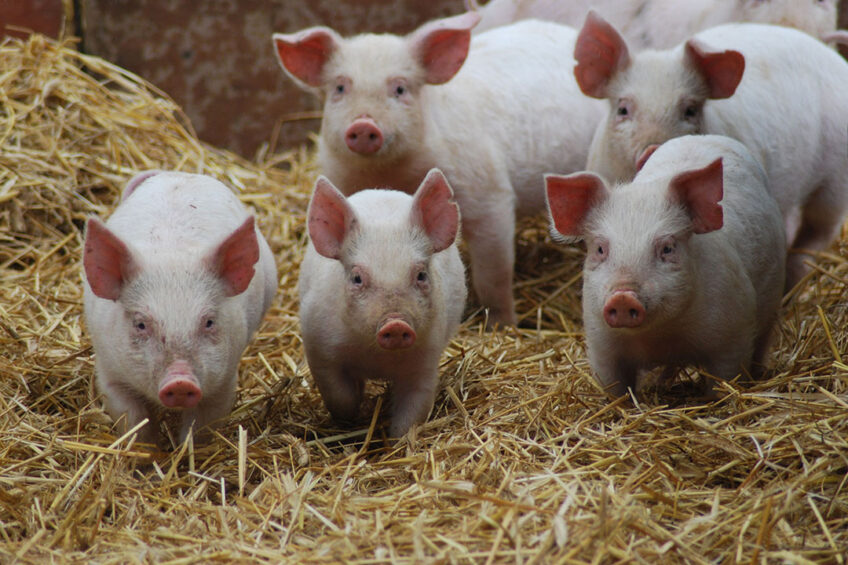Coated tannins: A potential alternative to antibiotics in pigs

A recent study published in the Journal of Animal Science (2022) examines the potential of coated tannins as an alternative to antibiotics, as they improve growth performance, nutrient digestibility and intestinal function in weaned piglets.
The recent decisions by the European Union to ban the use of zinc oxide added at medicinal levels in piglet feed and the prophylactic use of antibiotics to prevent post-weaning diarrhoea, is driving the need to find alternatives.
In recent years growing interest has emerged in the use of bio-active compounds from plants as an alternative to antibiotics. This is concurrent with a drive towards sustainable production strategies and consumer acceptance.
Among polyphenols, tannins are widely studied for their antiviral, insecticidal, nematocidal, antifungal, antibacterial and antioxidant properties and which, therefore, might offer a solution to improve diarrhoea and intestinal health problems in piglets.
Challenges associated with tannins
Tannin is a general term for a class of polyphenols, divided into hydrolysed tannin and condensed tannin. Some reports have shown that condensed tannin may reduce nutrient digestibility and hinder the growth performance of monogastric animals. Tannins can also lead to oxidative moisture absorption, poor palatability and feed intake reduction when added to feed. Fortunately, coating treatment can effectively solve these problems.
Advantages of coating
The coating treatment stabilises the tannin by adding a special structure to its surface. The coating also reduces the possible destruction of tannin by gastric acid and enzymes, improving the effective utilisation rate of tannin.
Study setup
The researchers explored the effect of coated tannin on growth performance and diarrhoea incidence, nutrient digestibility, intestinal morphology and mucosal barrier function in weaned piglets, as a potential alternative to antibiotics and ZnO. A total of 180 piglets (Duroc × Landrace × Yorkshire) were randomly allotted to 3 dietary treatments:
Control: basal diet (contains ZnSO4);
Tannin: basal diet + 0.15% coated tannin;
ZnO: basal diet + ZnO (Zn content was 1,600 mg/kg).
Growth performance and diarrhoea incidence
Compared with the control group, piglets fed a tannin diet had greater weight gain which increased by approximately 22%. The tannin diet showed a 10% improvement in the ratio of feed to weight gain. The difference in weight gain and feed efficiency between the tannin diet and ZnO diet was not significant. The protective effect of the coating treatment was suggested to have a possible effect in increasing feed palatability and feed intake. For diarrhoea incidence, the tannin group and ZnO group were significantly lower than the control group.
Alleviating the stress of weaning
It was concluded that 0.15% coated tannin effectively alleviates the stress of weaning, reduces the rate of diarrhoea and promotes the growth performance of piglets, which has an equal effect to ZnO (Zn content 1,600 mg/kg) supplementation. The positive effect on health was related to the tannin’s interference with the integrity of bacterial cell walls and inhibition of the reproduction of pathogenic micro-organisms. In addition, studies show that tannin could reduce the expression of cytokines interleukin-1β, interleukin-6 and tumour necrosis factor-α (TNF-α), thereby inhibiting the inflammatory response. In vitro studies also show that tannins suppress the expression of inflammatory genes in macrophages. It was suggested that tannins could have similar health benefits to the use of antibiotics or ZnO in weaned piglets.
Enzyme activity and nutrient digestibility
Previous studies have shown that high-dose hydrolysed tannin can combine with digestive enzymes and proteins which reduces digestive enzyme activity and protein digestibility. In the current study the digestibility of protein increased significantly with the supplementation of tannin. The coated tannin also significantly increased the activity of duodenal trypsin and jejunal mucosal maltase and sucrase, which was equivalent to ZnO. Coated tannin could promote the activity of digestive enzymes and play a positive role in the digestibility of nutrients. The digestibility of ash, calcium and phosphorus was slightly higher in both the coated tannin group and ZnO than in the control diet, however, the differences were not significant.
Intestinal morphology and mucosal barrier function
Intestinal morphology is an important indicator of the digestion and absorption of nutrients. Weaning stress in piglets usually causes diarrhoea symptoms which are accompanied by damage to intestinal villi, microvilli and intercellular connections.
Jejunum microvilli were much damaged in the control diet while they were more intact in the tannin and ZnO groups. Jejunum microvilli are arranged in a cylindrical shape. The results also showed that the colonic microvilli of the tannin and ZnO groups were more neatly, densely arranged and tightly connected while in the control group the intercellular junctions were broken.
For the expression of epithelial integrity-associated tight junction proteins, the researchers tested claudin-1, occludin, and ZO-1. The results revealed that the relative expressions of ZO-1, claudin-1 and occludin in the tannin group were significantly higher than those in the con group, indicating greater intestinal integrity. The observation was related to the ability of tannin to change the permeability and physiological functions of cells or the ability to improve the antioxidant capacity of piglets. In addition, 16S rRNA sequencing analysis showed that the microbial diversity indexes (Simpson and Shannon index) of the control and tannin groups were significantly higher than the ZnO group, indicating that ZnO reduced the intestinal microbiota diversity of weaned piglets.
Improve intestinal function
It was observed that coated tannins improve intestinal function and maintain the integrity of the intestinal barrier by increasing the relative abundance of butyrate-producing bacteria and other beneficial bacteria.
Conclusion
It was concluded that coated tannin supplementation improves growth performance and decreases diarrhoea incidence of weaned piglets through improvements in nutrient digestibility and digestive enzyme activity, maintains intestinal microbiota diversity and increases related gene abundance to improve intestinal morphology and barrier function. Coated tannins have the potential as a green and safe additive to replace antibiotics or zinc oxide to improve the health and growth performance of piglets. The researchers emphasised the need to consider factors that may affect the bio-activity of tannins, such as dose, type, chemical structure, concentration and time of exposure.
Main source: Journal of Animal Science (2022).







